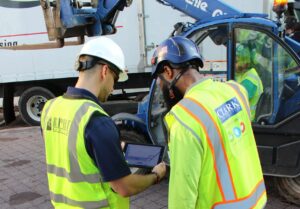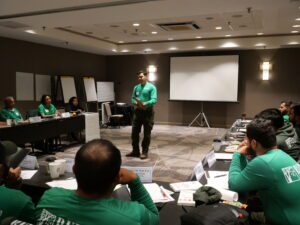By Scott Abbott, Talent Acquisition Specialist
 The challenge of retaining skilled and motivated employees has become a perennial concern in today’s world. The tug-of-war between keeping talent engaged in their current roles and the allure of greener pastures is prompting companies to become even more focused on aligning their retention strategies with prevailing trends.
The challenge of retaining skilled and motivated employees has become a perennial concern in today’s world. The tug-of-war between keeping talent engaged in their current roles and the allure of greener pastures is prompting companies to become even more focused on aligning their retention strategies with prevailing trends.
Technology integration, professional development opportunities, and a growing emphasis on diversity and sustainability have reshaped the workplace, altering the expectations of both employers and employees. Understanding these patterns is an important step for companies wanting to cultivate a loyal team and foster long-term growth. Here are a few areas of focus…
Embracing Technological Advancements
 The integration of technology across all industries has led to increased efficiency and training opportunities. In the landscape and construction industries, technology like drones and aerial imaging, GPS and geolocation, “smart” systems and tools, robotics, cloud-based project management and wide range of software and mobile apps available for design, estimation, and communication are helping to enhance efficiency, safety, sustainability, and project quality. Technology can also reduce administrative burdens and provide opportunities for more collaboration and communication, which enables team members to focus on more meaningful and strategic aspects of their jobs that might require creativity and critical thinking. When employees feel that their employer is providing the tools they need to do their job most effectively, it underscores that the company values their team’s time and skills and boosts job satisfaction.
The integration of technology across all industries has led to increased efficiency and training opportunities. In the landscape and construction industries, technology like drones and aerial imaging, GPS and geolocation, “smart” systems and tools, robotics, cloud-based project management and wide range of software and mobile apps available for design, estimation, and communication are helping to enhance efficiency, safety, sustainability, and project quality. Technology can also reduce administrative burdens and provide opportunities for more collaboration and communication, which enables team members to focus on more meaningful and strategic aspects of their jobs that might require creativity and critical thinking. When employees feel that their employer is providing the tools they need to do their job most effectively, it underscores that the company values their team’s time and skills and boosts job satisfaction.
Providing Professional Development and Defined Career Path
 Offering opportunities for professional growth and learning allows employees to acquire new skills and refine existing ones. That learning may include company-sponsored training courses, online learning resources, or classes provided by industry associations or local colleges. Or it may be a less formal learning environment that includes on-the-job safety and skills training, or one-on-one time spent with a mentor. Whatever the path, it not only enhances an employee’s capabilities but also boosts their confidence in their ability to contribute effectively to the organization. When employees feel their skills are improving and they are learning and growing, they are more likely to feel engaged and satisfied with their roles. Similarly, when employees have a clear understanding of potential career paths and how they can progress within the organization—and are given constructive feedback and regular performance reviews along the way—they are more motivated to work towards specific goals and stay committed to an organization.
Offering opportunities for professional growth and learning allows employees to acquire new skills and refine existing ones. That learning may include company-sponsored training courses, online learning resources, or classes provided by industry associations or local colleges. Or it may be a less formal learning environment that includes on-the-job safety and skills training, or one-on-one time spent with a mentor. Whatever the path, it not only enhances an employee’s capabilities but also boosts their confidence in their ability to contribute effectively to the organization. When employees feel their skills are improving and they are learning and growing, they are more likely to feel engaged and satisfied with their roles. Similarly, when employees have a clear understanding of potential career paths and how they can progress within the organization—and are given constructive feedback and regular performance reviews along the way—they are more motivated to work towards specific goals and stay committed to an organization.
Inviting Diversity and Inclusivity
A diverse workforce brings together people with varying backgrounds, experiences, and perspectives and encourages open discussions and constructive debates. This diversity of thought fosters creative problem-solving and innovative ideas, leading to more effective solutions and a competitive advantage in the market. Companies that can prioritize and embrace diversity are also more likely to adapt to changing demographics, societal values, and market trends which contributed to their long-term success. For employees, an inclusive workplace fosters a culture where employees feel valued and respected—all of which can contribute to long-term retention.
Focusing on Sustainability
 Organizations weaving eco-friendly practices into their fabric become magnets for those who crave purpose beyond a paycheck. The landscaping and construction industries are replete with examples of sustainable practices—from native and pollinator-friendly plant selection and smart irrigation systems to green building standards and waste reduction and recycling plans. Working for a sustainable company allows employees to see the tangible positive impact their work has on society and the environment, which can be a source of pride and motivation. Many sustainable practices, such as promoting healthier work environments, reducing pollution, and supporting wellness initiatives, can directly impact the well-being of employees. This, too, can lead to a better work-life balance and improved job satisfaction.
Organizations weaving eco-friendly practices into their fabric become magnets for those who crave purpose beyond a paycheck. The landscaping and construction industries are replete with examples of sustainable practices—from native and pollinator-friendly plant selection and smart irrigation systems to green building standards and waste reduction and recycling plans. Working for a sustainable company allows employees to see the tangible positive impact their work has on society and the environment, which can be a source of pride and motivation. Many sustainable practices, such as promoting healthier work environments, reducing pollution, and supporting wellness initiatives, can directly impact the well-being of employees. This, too, can lead to a better work-life balance and improved job satisfaction.
Acknowledging Contributions
 Regular acknowledgment of employees’ contributions and achievements fosters a sense of belonging and value. Recognition for individuals can be in the form of awards, bonuses, or even simple acts of appreciation like a note or conversation. Larger acknowledgement of great work by the team could be a company picnic, a rafting trip, or a barbecue. In addition to the obvious benefits of employees feeling that their work is seen and appreciated, the interaction and communication that occurs builds stronger relationships in the workplace and can increase the company’s reputation when happy employees share their positive experiences with others.
Regular acknowledgment of employees’ contributions and achievements fosters a sense of belonging and value. Recognition for individuals can be in the form of awards, bonuses, or even simple acts of appreciation like a note or conversation. Larger acknowledgement of great work by the team could be a company picnic, a rafting trip, or a barbecue. In addition to the obvious benefits of employees feeling that their work is seen and appreciated, the interaction and communication that occurs builds stronger relationships in the workplace and can increase the company’s reputation when happy employees share their positive experiences with others.
Embracing Change to Improve Retention
As the construction and landscaping industries continue to evolve, adapting to emerging trends is pivotal for employee retention. Companies that harness technological advancements, provide development opportunities and a career path, prioritize sustainable practices, and create a diverse and supportive work environment are poised to attract and retain the best talent and ensure their team remains firmly rooted even in the face of alluring job prospects elsewhere.